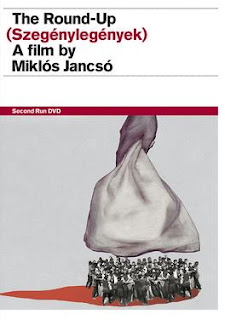Człowiek z żelaza; political drama, Poland, 1981; D: Andrzej Wajda, S: Jerzy Radziwiłowicz, Marian Opania, Krystyna Janda, Irena Byrska, Wiesława Kosmalska
A radio reporter, Winkel, is summoned by the communist authorities to find dirt and make a report about steel worker Maciej Tomczyk who leads a strike at the shipyard in Gdansk, so that the TV editors can later edit it into a disinformation campaign to discredit Maciej. At a protest where Maciej holds a speech, Winkel meets an acquaintance, Dzidek, who tells him more: in '70, Maciej's father Birkut was killed during the government crackdown of protestors. Winkel also visits Agnieszka in police custody, who tells him how she married Maciej, but had to leave with their baby to live with her father from fear of the authorities. Despite blackmail from the authorities, Winkel quits his job and embraces the Solidarity labour movement. An agreement is later reached, granting the protestors a labour union independent from the communist authorities.
One of Andrzej Wajda's most famous films, "Man of Iron" is an unapologetically activist film. There is nothing here besides politics, to such an extent that even characters, narrative and cinematic craftsmanship are neglected or even discarded, and thus viewers unfamiliar with the Solidarity movement and its role in the fight for democracy in Poland will not be able to understand the film and won't like it. Nontheless, it was a daring and subversive movie back in the time, a rare story openly critical of the communist dictatorship of Poland in 1981, and even today it is fascinating to wonder how it was allowed to be made in the first place—even the title, "Man of Iron", is a spoof of Stalin's propaganda name "Man of Steel". The opening text slyly says: "All the characters and their names in the film are a work of fiction. But they enact events that really happened." The protagonist Maciej Tomczyk, a shipyard worker, is an allegorical depiction of Lech Walesa (who even makes a cameo five times in the film, either through archive footage or direct appearance in front of the film cameras), whereas Wajda strives towards blending fiction and reality, since some of the protests were filmed on the spot, thereby achieving almost a documentary film at times, even including other key members of the Solidarity movement in certain scenes, such as Anna Walentynowicz.
Some moments are brilliant. For instance, the ironic scene where a communist member turns around a big violin in his apartment, revealing alcoholic drinks hidden inside it, to offer it to radio reporter Winkel. The sequence where Maciej is assaulted by three paramedics in the hallway who sedate him and put him in a straightjacket, and later in a mental asylum, is a strong example of political abuse of psychiatry, as is the sequence where Maciej and his friends bury the corpse of his father in earth of a graveyard, but when they return later, they discover his body is gone and a new cement tombstone with someone else is now found on his place. These moments have weight since they illustrate that archetypical situation where an evil government is wrong, but instead of admitting its mistake and changing, it rather invests all the resources to gerrymander reality by trying to present good people as evil in order for said evil government to appear good. Some of the dialogue also works, for instance when father Birkut says: "No lie lasts forever" or when Maciej has this exchange with a shipyard worker: "But you will be a slave!" - "I know, but I will still live longer. Your uprising won't change anything." On the other hand, the majority of the lines are schematic and only at the service of checking political points, without much effort to make it more enjoyable for the viewing experience. At 2.5 hours, the movie is definitely overlong by at least 30 minutes and needed better planning—instead of its excessive inclusion of as many details and events from that historical time, since sometimes one symbolic scene is able to say more than ten superfluous scenes repeating the same thing. Unfortunately, despite noble intentions, "Man of Iron" is too dry, since it is more activist inspired than cinematically inspired.
Grade:++















